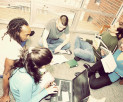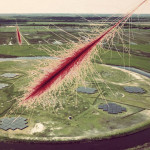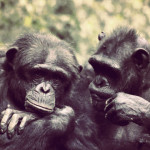‘Free riders’ always choose for themselves
‘You have people who always work together’, says Piet van den Berg, ‘while others only do that if it benefits them.’ The collaborators are real sweethearts, the biologist believes. But do they profit from this?
Earning money
Do you opt for the interests of the group or for yourself? The answer to this question is not the same for everyone, Van den Berg discovered in his research on the evolution of social behaviour, for which he will receive his PhD on Friday. The way we deal with others evolves just as much as our psychical attributes do; this is partly due to copying behaviour and partly through inheriting it. The crazy part is that people are pretty rigid in terms of personality. ‘You would say that we are super flexible when it comes to adapting our behaviour to the situation at hand. Thus we are angry when it is necessary, but cooperative when the situation requires it.’ That is, however, not the case.
‘If people do not know one another, then almost all of them choose themselves over the rest’Van den Berg focused his research on cooperation – something which has already been thoroughly researched by psychologists, but has received much less attention from biologists, and none from an evolutionary perspective. He gave groups of students the chance to earn money. Students did not know or see each other. Everyone received twenty euros with the message that they could put some of this in the jar. The money in the jar was doubled and then divided equally among the group. If everyone were to put twenty euros in the jar, they would go home with 40. However, if only three members of the group put in twenty and one put in nothing, then the three get 30 euros, while the one who put nothing in walks away with 50 euros; a substantial amount of money for the student wallet.
Striking outcomes
‘This is a classic experiment. If people do not know one another, then almost all of them choose themselves over the rest and do not work together’, says Van den Berg. However, if you let the group do the same test more often, around twenty times, then you observe them paying more attention to each other; they especially take more risks at the start, probably because they have more time to keep on going with the group.’
But it only became interesting when Van den Berg allowed participants to ask for information about their group mates. They were allowed to ask four questions and could choose to receive an answer to the question as to whether the other player had cooperated, or how much they had earnt. The outcomes of that research were rather striking, says Van den Berg. Those who had asked for ‘behavioral information’ emerged as the group members who had also worked together much more often. However, those who principally wanted to know about the success of others, were the ones who chose themselves.
The biggest advantage
To top it off, Van den Berg conducted one final test. He gave student participants information about how the others had used the money. And what were the results? The majority indeed used the money in about the same way as the others, but there was still a sizeable group of around ten to twenty per cent who did not put anything into the pot, precisely when the rest had spent all their money.
It is actually always more ‘advantageous’ not to cooperate but to hope that others willThese are the real free riders: those who pick themselves in any case no matter what others do and also manage to gain the biggest advantage along with this choice.
Why is that? It is actually always more ‘advantageous’ not to cooperate but to hope that others will. Nevertheless, these different types of behaviour came into existence side by side, and that is rather odd. ‘If we were concerned with the length of legs, for example, an optimum would be reached over time’, says Van den Berg. ‘The length that gave the most chance of reproduction would be the optimum. However, this works differently with social attributes.’
Group selection
Van den Berg thinks that this is possibly due to so-called negative frequency-dependent selection. This means that the attributes which seldom occur, are actually advantageous. In a world of cooperation, being selfish is advantageous. However, if everyone is being selfish, you have the advantage if you can work well with a group.
‘Lastly, it is good for the group, and that can count. The theory of group selection is not indisputable, but it could well play a role’, thinks Van den Berg. ‘It is then not very handy for an individual to be cooperative, but it is on a group level. The group functions better, which results in more of an advantage for group members nonetheless. ‘
If you find yourself back in a group with one of these notorious free riders, make sure that you get away; after all, they just pick themselves in the end, anyways.






